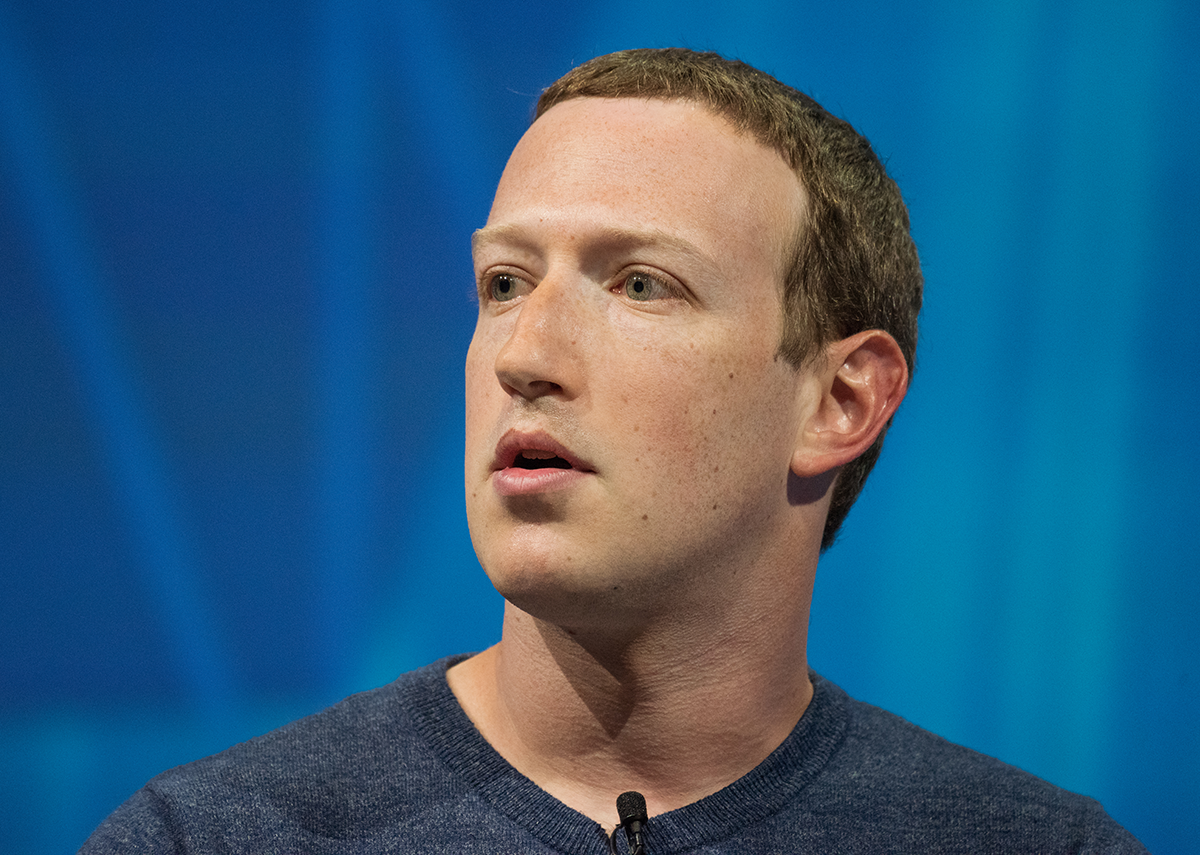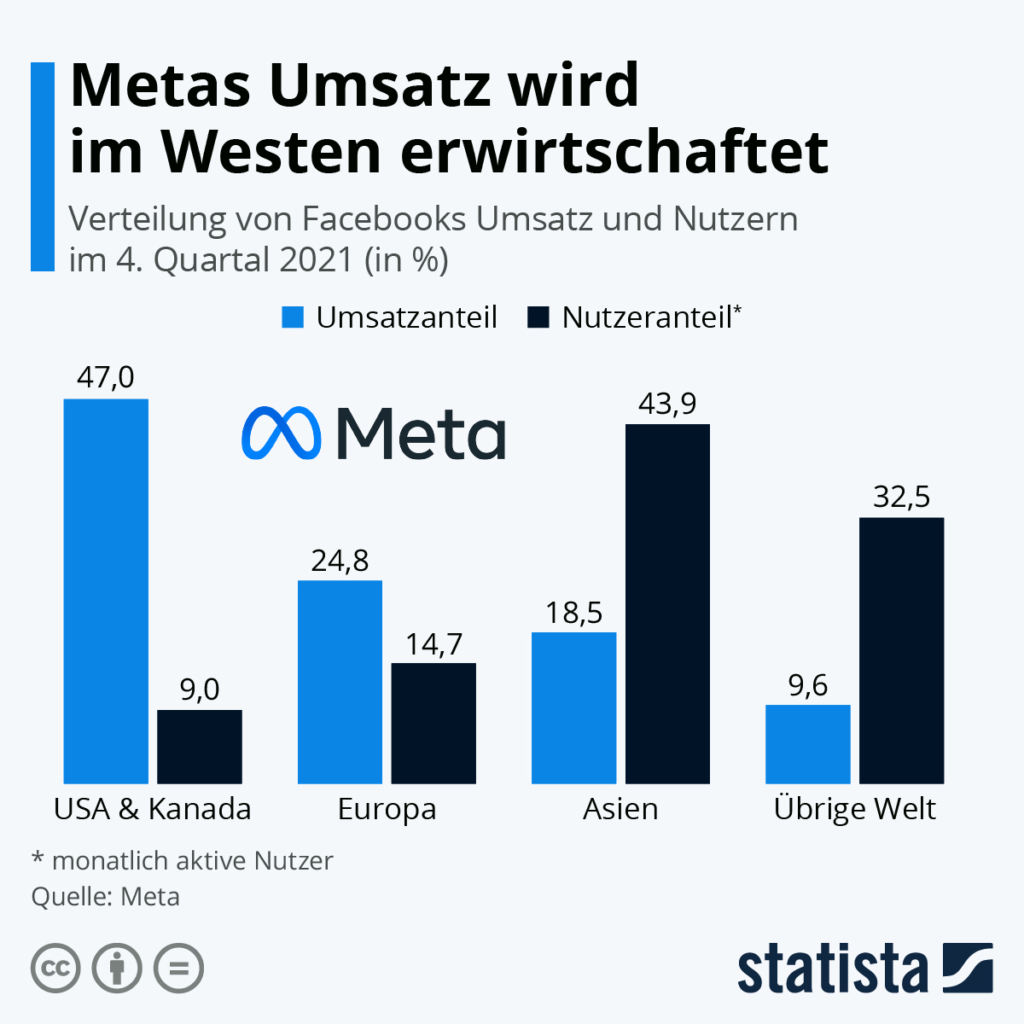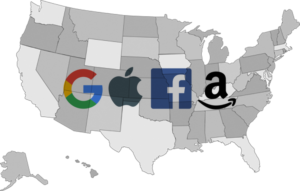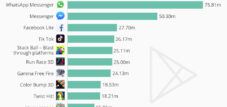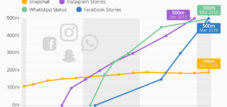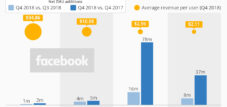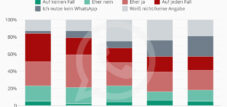Meta or not, that is the question – does the way lead out of Europe?
Language selection 📢
Published on: February 10, 2022 / update from: 16. February 2022 - Author: Konrad Wolfenstein
Meta's sales are generated in the West
"To transfer, process and/or receive [...] this could affect our ability to provide our services," Meta writes there, according to a report by T-Online . As a result, the leading days around CEO Zuckerberg expects negative effects on its own financial results. However, it would also have a withdrawal from Europe. The continent is responsible for around a quarter of total sales and thus the most important world region for Meta behind North America. The majority of the users are at home in Asia (43.9 percent) and the rest of the world (32.5 percent), but only 28 percent of sales are generated there.
English Version: Meta's revenue is generated in the West
Meta is toying with the Idea of Shutting Down Facebook and Instagram in Europe. In Its Annual Report to the Us Securities and Exchange Commission (SEC), The Company Cites EU Data Privacy Rules as The Reason. “If we are independent to Transfer, Process and/Or Receive Data Between the Countries and region in which we operate […] This could affect our ability to provides our services,” Meta Writes there, According to a Report by T-Online . As a result, the management around CEO Zuckerberg Expects a Negative Impact on Its Own Financial Results. A withdrawal from Europe would Impact have a negative impact. The Continent is Responsible for about a Quarter of the Total Revenue and Is Therefore The Most Important World Region for Meta After North America. Although the Majority of Users are at home in Asia (43.9 Percent) and the Rest of the World (32.5 Percent), Only 28 Percent of Sales are generated there.
Mark Zuckerberg
According to the 2020 Forbes list, Zuckerberg's net worth is approximately $78 billion. This puts him at number 7 on the list of the richest people in the world. He is the founder and CEO of the company Meta Platforms, in which he holds a 28 percent stake, as well as the founder of the social network Facebook, which is part of Meta.
Who owns Meta?
There are different information in the press about the exact composition of the main shareholders and their shares in the company. The Swiss trading newspaper published the following shareholder structure on May 14, 2012:
- Mark Zuckerberg (28.2%)
- Accel Partners (10%)
- Dustin Moskovitz (7.6%)
- Mail.ru Group (5.4%)
- Eduardo Saverin (4%)
- Sean Parker (4%)
- Peter Thiel (2.5%)
- Sheryl Sandberg (1.8%)
- Microsoft (1.5%)
- Greylock Partners (1.5%)
- Cameron Winklevoss (0.22%)
- Tyler Winklevoss (0.22%)
The website whoownsfacebook.com comes up with largely the same values for the main shareholders, but lists other shareholders with shares well below 0.1% in the company. The Winklevoss twins, who had a legal dispute with Zuckerberg over the authorship of Facebook, are listed here with 0.22% each.
In 2018, Vanguard Group (7.10%), BlackRock (6.10%) and Fidelity Investments (5.10%) held shares in Facebook. In 2020, Vanguard Group (7.30%) and BlackRock (6.30%) held shares in Facebook.
An excerpt of problems and criticism with Meta in Europe
Influence (EU)
In Europe, Facebook is at the top of the tech companies in 2020 with spending on lobbying of 5.5 million euros.
Suitable for:
Transfer and use of WhatsApp user data
Two years after Facebook bought the instant messaging service WhatsApp for $20 billion, WhatsApp changed its privacy policy on August 25, 2016. In the future, phone numbers of contacts in the WhatsApp user's address book would be passed on to Facebook and used there. On September 27, 2016, the Hamburg data protection officer Johannes Caspar banned Facebook from using and passing on WhatsApp data. Facebook did not obtain clear consent from WhatsApp users to pass on and use the data. Previously stored data should be deleted. Since Facebook's German business is managed from Hamburg, Caspar has the responsibility to enforce German data protection law against Facebook and its subsidiary WhatsApp. Facebook announced that it would appeal the decision.
Tax evasion
Facebook avoids billions in tax payments with legal tax planning such as the Double Irish With a Dutch Sandwich principle. This practice is increasingly criticized.
In August 2020, France and Facebook agreed on an additional tax payment of more than 100 million euros for the years 2009 to 2018 as part of a tax dispute that had lasted for years. A year earlier, France had passed a law to tax internet companies. However, according to calculations by the French magazine “Capital”, Facebook would have to pay almost 150 million euros in back taxes if the company were to declare the entire sales generated in France by “Capital” of an estimated 1.3 billion euros there.
Unauthorized use of facial recognition software
On March 2, 2021, the Süddeutsche Zeitung reported that, after years of litigation, Facebook would pay $650 million (equivalent to 539 million euros) to the plaintiffs because of the use of facial recognition software. The lawsuit, filed in Illinois in 2015, was joined by almost 1.6 million Facebook users. They had accused Facebook of using facial recognition software on photos they uploaded without their prior consent. Each class member can expect to receive at least $345.
Threats about research on Instagram
In a research project, Algorithmwatch wanted to examine the content of Instagram and offered a browser extension that had downloaded 1500 users. However, because Facebook has announced that the organization “hardly” announced legal steps, the study was ended. On a legal dispute with the billion dollar group, one did not want to let it and the work can therefore be stopped. At the end of July 2021, Facebook also banished a scientist and a scientist from New York University from the platform. The two had researched disinformation and over the Facebook advertising library. This advertising library was a searchable database that contains voting advertising or advertising on politically relevant topics.
Consumer advice centers against Facebook
On March 6, 2012, the Berlin Regional Court ruled that numerous clauses in Facebook's terms and conditions were invalid. In its general terms and conditions, Facebook is therefore not allowed to grant itself a comprehensive, worldwide and free right of use for content that Facebook members have posted in their profiles. Facebook may only use copyrighted works with the consent of Facebook members. According to the Berlin Regional Court, the declaration of consent with which Facebook members agree to data processing for advertising purposes is also illegal. In addition, Facebook must ensure that timely information is provided about changes to the terms of use and data protection regulations. Ultimately, the friend finder button violates German law. In particular, the court prohibited the import of addresses from the user's address file into Facebook's database, which is triggered with this button. In August 2012, the Federal Association of Consumer Organizations sent a V. Facebook issued a warning to force changes to the app center. Consumer advocates see Facebook's access to users' personal contacts as a violation of the Telemedia Act.
Ads against Facebook Europe
In mid-August 2011, a group of Facebook users led by Austrian law student Maximilian “Max” Schrems filed 16 reports with the Irish Data Protection Authority (Office of the Data Protection Commissioner) against Facebook Ireland Ltd. a. All users outside the United States and Canada have a contract exclusively with Facebook Ireland Ltd., Facebook's subsidiary responsible for Europe. The student group believes that the Irish authority is responsible for enforcing the data protection and consumer protection rights of Facebook users in the European Union. The group justifies this by saying that European data protection law applies due to the company's headquarters in Dublin and, in addition to the Irish Data Protection Act, refers to the EU Data Protection Directive 95/46/EC of 1995.
On August 24, 2011, the Data Protection Commissioner in Ireland (DPC) sent a letter to the complainants stating that the Irish authority had declared itself responsible and would begin an investigation. On September 4, the Irish newspaper Irish Independent reported, citing the DPC, that the agency would conduct a comprehensive investigation beyond the content of the 16 advertisements. As the strictest form under Irish data protection law, an investigation should also take place at Facebook's European headquarters in Dublin. This was confirmed by the spokeswoman for the Irish data protection authority at the request of ORF.at.
Xpert.Digital – Konrad Wolfenstein
Xpert.Digital is a hub for industry with a focus on digitalization, mechanical engineering, logistics/intralogistics and photovoltaics.
With our 360° business development solution, we support well-known companies from new business to after sales.
Market intelligence, smarketing, marketing automation, content development, PR, mail campaigns, personalized social media and lead nurturing are part of our digital tools.
You can find out more at: www.xpert.digital – www.xpert.solar – www.xpert.plus
Source *10022022-1



